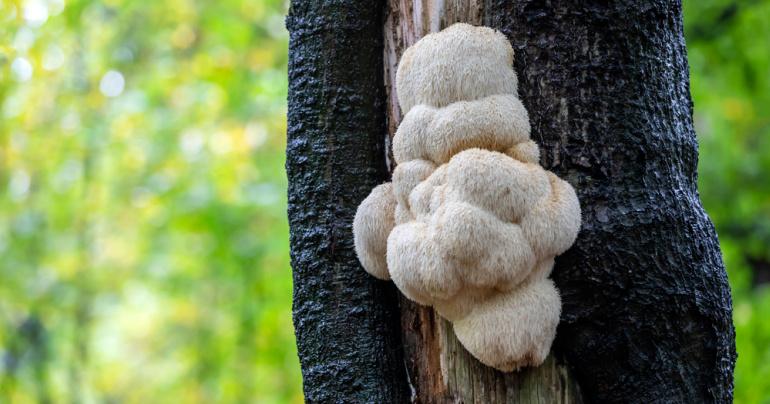
Lion’s mane, also known as yamabushitake, is an edible mushroom that is sometimes used as a culinary ingredient but is also sold as a dietary supplement. As a supplement, lion’s mane is used primarily for cognitive enhancement and immune support.
Several studies have shown that it improves mood, memory, and cognitive function, or at least prevents cognitive decline. It is also believed to either suppress or enhance inflammation, depending on the context.
In this article, we’ll look at what studies say about the benefits of lion’s mane, where lion’s mane is grown, and where to buy lion’s mane mushrooms. We’ll also answer some of the most commonly asked questions about lion’s mane.
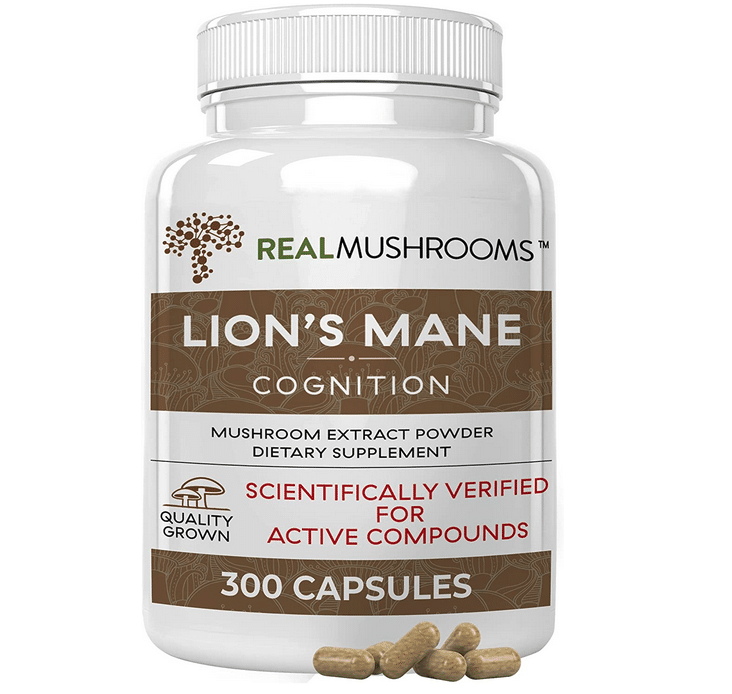
Looking for the best lion’s mane supplement?
Real Mushrooms uses non-GMO, organic lion’s mane mushrooms whose fruiting bodies are hot water extracted to create a pure, chemical-free product. Their capsules are free of grain fillers and each serving of 2 capsules provides 1,000 mg of extract that has a concentration of 25%+ Beta-glucans.
Lion’s Mane Studies
So far, most lion’s mane studies have been performed on rats and mice, but there have been a few studies conducted on humans. More importantly, we have a rough idea of its effective dosage and we know how lion’s mane works with respect to its primary mechanism of action.
Lion’s Mane For Memory
While lion’s mane is widely believed to improve memory, the evidence for this in humans is still mostly indirect. That said, multiple lines of research do support the use of lion’s mane for this area of health.
In wild-type mice, lion’s mane was shown to improve spatial memory and in elderly mice it was shown to reverse age-related decline in recognition memory. In fact, quite a few studies have found similar benefits in mice.
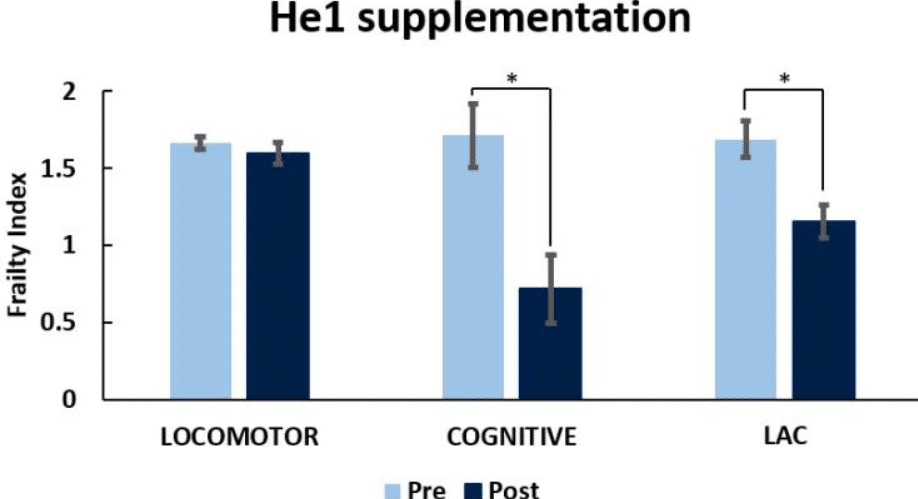
In humans, however, studies haven’t really tested memory per se in non-elderly subjects. There is evidence that lion’s mane can partially reverse mild cognitive decline in elderly humans. However, this benefit was not permanent and began to decline gradually over the four weeks following cessation of lion’s mane supplementation.
While there is reason to think lion’s mane might improve memory in cognitively healthy humans, there’s no direct evidence for it yet. It’s worth a try, but don’t expect big improvements.
Lion’s Mane For ADHD
Lion’s mane has not been studied as a treatment for ADHD, and since it doesn’t appear to work by acting on dopamine, there’s no reason to suppose it would be effective for treating ADHD.
That said, several other conditions such as anxiety, depression, and insomnia have high comorbidity rates with ADHD– and as you’ll see, lion’s mane may be helpful in treating them. So, while it can’t treat ADHD as such, lion’s mane may help with some of the secondary issues stemming from ADHD.
Lion’s Mane For Anxiety
Several studies support lion’s mane ability to reduce anxiety symptoms. In one human study, women going through menopause experienced a reduction in anxiety symptoms after 4 weeks of taking lion’s mane. However, this study did not directly investigate the mechanism behind this effect, which raises the question of whether these effects may be specific to menopause or other hormonal issues.

Another study, however, found that lion’s mane reduces anxiety in mice. And in this case, the mechanism was identified as the promotion of neurogenesis in the hippocampus. That also suggests that the benefits may last beyond cessation of lion’s mane’s usage since the new neurons would continue to exist.
Lion’s Mane For Depression
The same studies which found a reduction in anxiety symptoms also noted a reduction in depressive symptoms. This is apparently due to the same reason – an increase in neurogenesis in the hippocampus via increased production of nerve growth factor.
Lion’s Mane For MS
Multiple sclerosis is characterized by the destruction of the myelin sheaths coating the synapses between neurons. Because it promotes neurogenesis, lion’s mane has been theorized to reduce MS symptoms. Indeed, one study has found that lion’s mane stimulates the growth of myelin sheaths.
That said, no studies have actually tested lion’s mane on MS patients yet, so take this one with a grain of salt.
Lion’s Mane For Sleep
Few studies have examined the effects of lion’s mane on sleep. Since it can reduce anxiety, there’s a theoretical basis for thinking that lion’s mane could improve sleep, at least in anxiety patients. That said, the aforementioned study on menopausal women found no statistically significant improvement in sleep quality, despite reductions in anxiety.
More studies are needed here as it’s likely that there is an effect, but it may not be very large in practical terms.
Lion’s Mane For Dementia
Multiple studies conducted in both humans and mice support the finding that lion’s mane slows cognitive decline and can at least temporarily reverse symptoms of cognitive decline at a dosage of 3 grams a day for 16 weeks.
Although the improvements started to at least partially reverse after the cessation of lion’s mane treatment, the fact that lion’s mane works by enhancing neurogenesis suggests that the effects may be at least partly permanent or semi-permanent, lasting beyond cessation of treatment.
Lion’s Mane Mushroom Side Effects
Studies so far have found that lion’s mane typically has no side effects. One study in rats found no measurable side effects of lion’s mane even after ingestion of 1000 mg/kg of body weight for 90 days.
That said, it’s generally safe to assume that if a drug or supplement has main effects, it also has side effects. Given that lion’s mane appears to work by promoting neurogenesis, it’s possible that side effects would take a longer time to materialize.
As I noted in my review of dihexa, there is at least one potential danger associated with having too many neurons, or at least too many synapses: autism. Autistic spectrum disorder has been linked to having an excessive number of synapses, leading to mental overload.
This is unlikely to be a major concern in users suffering from cognitive impairment. However, it should give you a serious reason to think more before using lion’s mane for cognitive enhancement if you’re already neurologically healthy.
That said, it is possible to be allergic to lion’s mane.
Lion’s Mane Allergy
In one case study, a 63-year-old man was admitted to a hospital suffering from acute respiratory distress apparently caused by an allergic reaction to lion’s mane, which he had been taking four months prior. He was able to recover with steroid therapy but showed damage to his lungs. Doctors stated that it was probable that lion’s mane had caused the issue.
In another case study, a 53-year-old man who cultivated mushrooms developed contact dermatitis in response to lion’s mane. Notably, the man had farmed other mushrooms for decades but developed dermatitis only one month after beginning to cultivate lion’s mane.
While this allergic reaction appears rare, people who are strongly prone to allergies may wish to avoid lion’s mane.
Alternatives To Lion’s Mane
Given the so far thin evidence for lion’s mane and the potential for allergic reactions, you may want to consider using alternative supplements. Here are a few possibilities.
Dihexa
If your main intent in considering lion’s mane is to promote neurogenesis, you might consider dihexa instead. As noted in our review, multiple studies confirm that dihexa massively increases neurogenesis.
Although it’s not yet readily available, a few research chemical companies have started to sell dihexa. Be sure to research your sources thoroughly though, as research chemical vendors are notoriously opaque in their quality control and sourcing.
Reishi Mushroom
Somewhat better-studied than lion’s mane, reishi mushrooms– aka ganoderma lucidum– have similarly been noted to reduce fatigue, anxiety, and depressive symptoms.
Furthermore, like lion’s mane, reishi mushrooms promote neurogenesis and this seems to be at the root of most of their other benefits.
For more information on reishi mushrooms, read The Unwinder’s article about chaga and reishi mushroom supplements.
Ashwagandha
If your main interest in lion’s mane relates to anxiety reduction, you may want to consider ashwagandha for stress relief. Ashwagandha is highly effective at reducing stress, anxiety, and cortisol levels. It’s also quite effective as a sleep aid.
Unlike lion’s mane, ashwagandha works immediately, by directly reducing stress rather than by increasing neurogenesis. That does mean the benefits won’t last beyond cessation of ashwagandha usage– but it also means you don’t have to worry about long-term side effects.
If you’re interested in ashwagandha, here are our ashwagandha brand recommendations.
How To Use Lion’s Mane Mushroom
If you’re set on trying lion’s mane mushroom supplements, here’s what you need to know about how to take lion’s mane.
Lion’s Mane Dosage
Lion’s mane dosages used in studies have varied between one and three grams per day. It’s not yet clear which exact dosage within this range is ideal, nor what the exact dose-response relationship is.
Given the potential for allergic reactions, it makes sense to be conservative, starting out with only one gram a day before very slowly ramping up the dosage.
When To Take Lion’s Mane
Studies have often divided lion’s mane dosages into several doses per day. For instance, a three-gram per day dosage is often divided into one gram, three times a day.
Given that lion’s mane works via promoting neurogenesis and its effects are mostly long-term, the timing probably isn’t terribly important. You could make the argument that since neurogenesis mostly takes place during sleep, lion’s mane may be more effective when taken at night, but this is only speculative.
In fact, the main benefit of dividing the dosage is probably just that it reduces any potential for gastric upset. That said, given that the half-life of lion’s mane is unknown, it makes sense to divide your dosage throughout the day.
One last thing to consider is that due to the unknown long-term effects of lion’s mane, it might be smart to use it only in short cycles with breaks in between. For instance, you could take one gram a day for 4-16 weeks, then take a few months off, before doing another cycle at two grams a day, and so on. That would allow you time to assess the long-term effects of lion’s mane.
What To Look For When Buying Lion’s Mane
The most important thing to look for when buying lion’s mane is dosage. Simply put, avoid purchasing lion’s mane supplements (or any supplements really) that don’t list the exact dosage or conceal it within a “proprietary blend.”
Of course, you also want to look at reviews– what are consumers saying about a given product? This is one reason why we generally recommend buying supplements on Amazon, as it limits sellers’ ability to rig the review process.
Beyond that, you should look at the credibility of the companies selling lion’s mane. Ask yourself the following questions:
- Do they have professional websites?
- Is it clear where their lion’s mane is sourced from and where it’s processed?
- Do they provide certificates of analysis?
- Is it clear who actually runs the company and where it’s based?
I go into more detail on this in my article about how to evaluate supplement vendors on Amazon.
What Are The Most Trustworthy Lion’s Mane Brands?
While lion’s mane is available in whole mushroom form, it is usually sold as a powder, in capsules, or less commonly in a tincture. Some companies have also started selling lion’s mane coffee and tea.
As with any supplement, the powdered form is the cheapest but also requires the most work to use. The good news is that it’s water-soluble, and the taste is okay– often described as vaguely seafood-ish, almost like crab or lobster. Powdered lion’s mane tends to mix well, meaning both that it dissolves and the flavor works well, especially with hot tea or coffee.
Real Mushrooms
Real Mushrooms, as its name implies, sources all of its supplements from “real” mushrooms compared to many other companies in the medicinal mushroom marketplace that fail to include true mushrooms in their products. Other companies tend to source their products from mycelium, which is the root system of the mushroom that’s grown on grain.
Real Mushrooms sources its organic mushroom extracts from Nammex, which is a company that was founded by the father of the creator of Real Mushrooms, Jeff Chilton. Jeff Chilton has over 40 years of experience in growing mushrooms and was the first person to provide the North American market with both standard mushroom extracts and organic mushroom extracts.
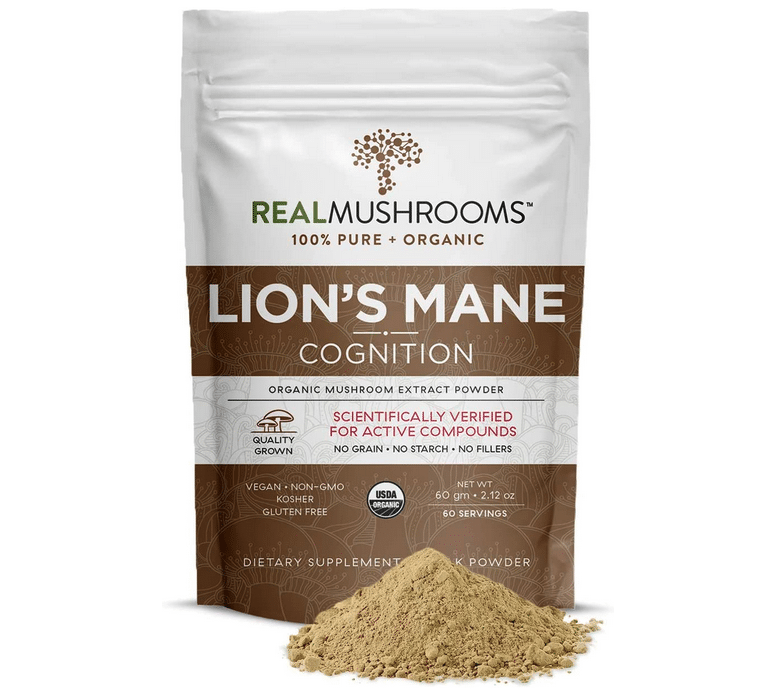
Rest assured, Real Mushrooms is highly regarded when it comes to purchasing most any type of mushroom-based supplement and all of its products are free of carriers or grain fillers. Its lion’s mane powder is 100% organic and water-extracted.
It’s also 3rd-party lab-tested and guaranteed to contain at least 25% beta-glucans, which is the active ingredient in lion’s mane. Real Mushrooms also sells lion’s mane in capsule form in addition to the traditional powder form.
Double Wood Supplements
All products sold by Double Wood Supplements are made in the US, tested for purity, and come with free shipping. Additionally, the company provides both the certificate of analysis and third-party test results for each of its supplements.
Double Wood Supplements is among the most trusted names for natural supplements and has been named to the Inc. 500 list of the fastest-growing private companies in the US, despite just being created in 2013.
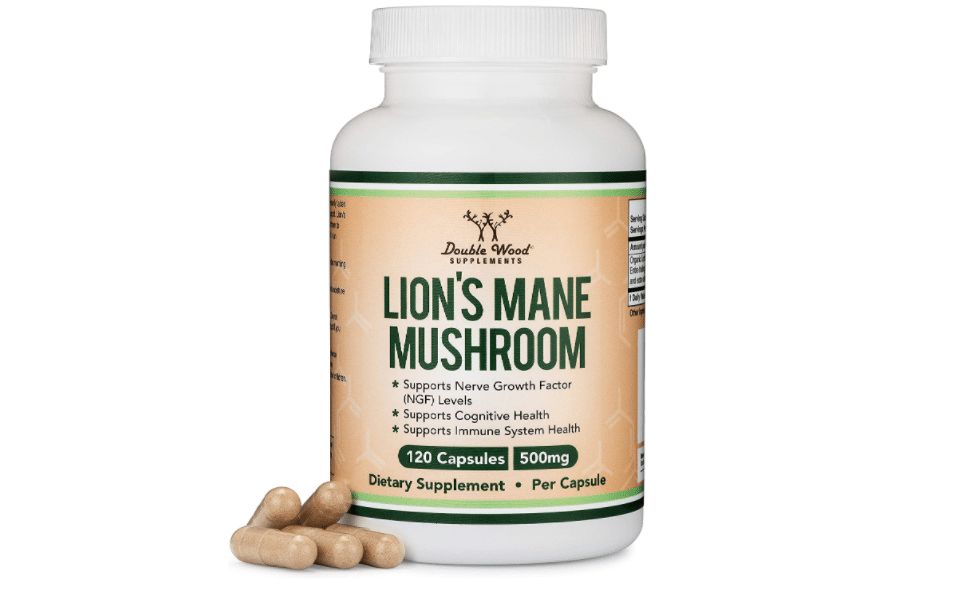
Double Wood offers 500 mg lion’s mane capsules which are an excellent choice for those just starting lion’s mane and want to see how a more conservative dose affects them, or for those who simply want to dose more easily. The company produces organic and vegan-friendly capsules with US-grown lion’s mane.
Teecino
Teecino was founded in 1993 by Caroline MacDougall on the premise of creating a natural alternative to coffee and tea. It’s now the #1 brand for coffee alternatives and roasted herbal teas and offers 24+ organic and gluten-free flavors. Teecino sources organic-compliant, natural, and certified organic flavors that are derived from plants and supports fair-trade practices by working with small family farmers and rainforest villagers in addition to its partners in the US and Europe.
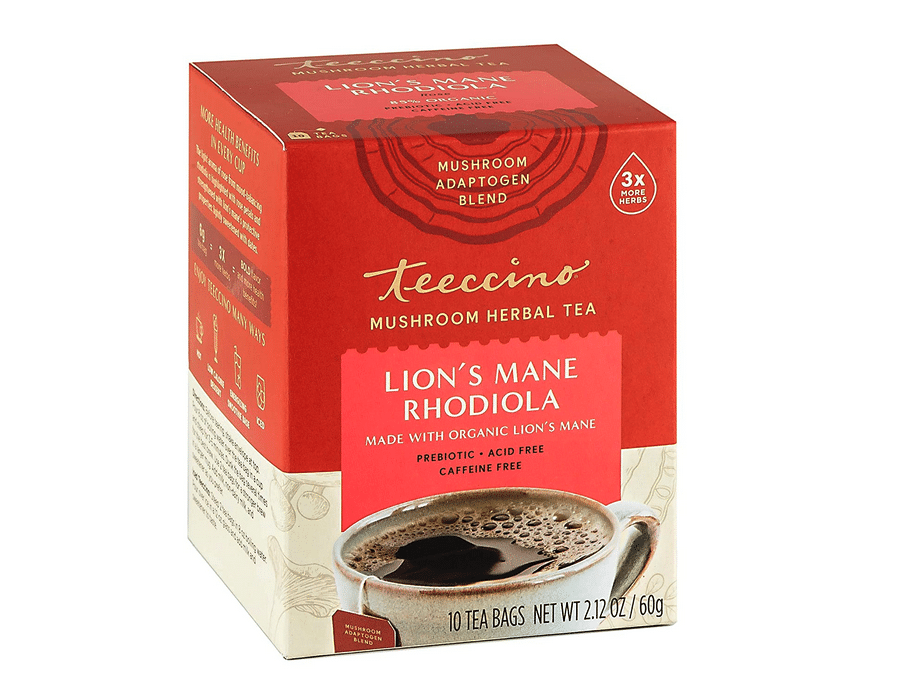
Teecino’s herbal adaptogen tea combines low doses of lion’s mane and rhodiola rosea– 300 mg of each. That’s a very low dose of lion’s mane, but a decent dose of rhodiola, which acts as a non-jittery stimulant– for more information, you can read our article on rhodiola rosea supplements.
For best results, consume 2-4 cups a day, spaced throughout the morning and afternoon.
Four Sigmatic
Four Sigmatic has roots in Finnish culture as the founder’s Finnish grandparents brewed mushrooms (chaga mushrooms) when they were unable to obtain coffee. The founder, Tero, decided to share Finnish traditions with the world in the form of immune-boosting mushroom coffee, elixirs, shots, and other supplements.
All of Four Sigmatic’s products have either the USDA organic seal or CCOF certified organic seal and use the actual fruiting body of each mushroom, not the root system. Additionally, all mushrooms are extracted using methods that result in the highest concentrations of beta-glucans, polysaccharides, triterpenes, and other adaptogenic compounds, and each batch of products are tested in third-party laboratories for toxins including heavy metals, allergens, bad bacteria, yeasts, molds, mycotoxins, and pesticides.

Known best for its adaptogenic coffees, Four Sigmatic offers both a lion’s mane coffee and a lion’s mane elixir with rhodiola rosea and rose hips. The coffee is perfect for a morning pick-me-up, while the elixir is better used in the later afternoon and early evening.
Genius Mushrooms
The Genius Brand was created to deliver the highest-quality natural ingredients at the most affordable prices possible. Genius does not target the use of its products to specific groups of people, rather its products are designed to enhance the health of anyone that’s looking to boost their immune system and rely upon clinically dosed supplements that are crafted with effective ingredients in their raw forms. The Genius Brand sells products that range from nootropics to weight loss supplements, workout enhancers, and more.
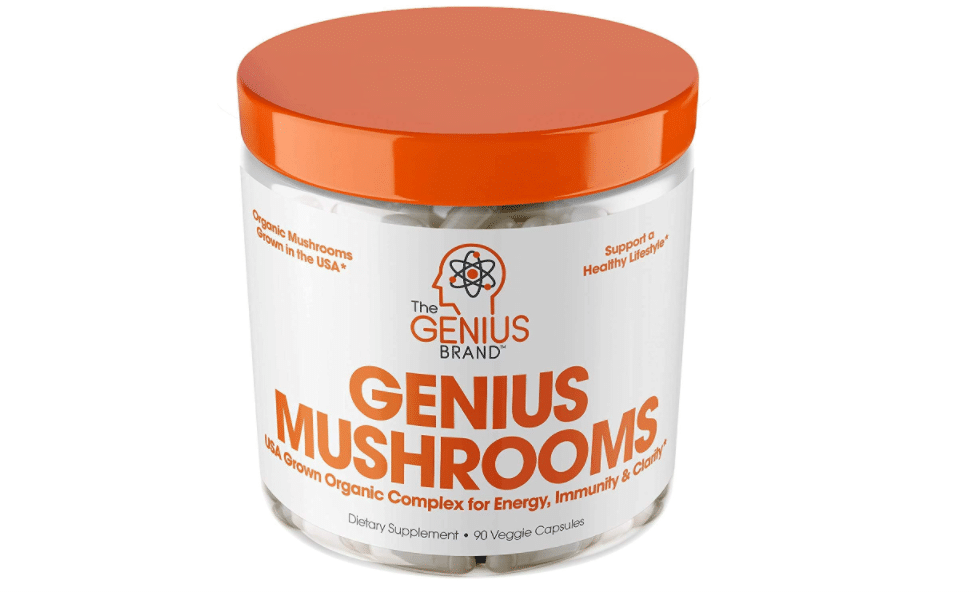
Genius Mushrooms’ adaptogenic fungi supplement combines lion’s mane, cordyceps, and reishi to create a caffeine-free blend that provides a mild energy boost along with immune support and a more gradual boost to neurogenesis.
Want to buy lion’s mane? Check out our review of the best lion’s mane supplements
Lion’s Mane FAQs
Does Lion’s Mane Mushroom Get You High?
No, in fact, there shouldn’t be a very noticeable immediate effect at all. At most, you should feel a mild boost to energy and well-being, but nothing that approaches feeling “high.”
How Much Lion’s Mane Powder Should I Take?
One to three grams of lions mane a day. If taking more than a gram a day, the dose should probably be divided, though this is more to ease digestion than anything else.
What Are The Side Effects Of Lion’s Mane Mushroom
Lion’s mane tends to have very few side effects, though as noted, allergic reactions can happen in rare cases. These seem to mainly be respiratory in nature, so you should be careful not to inhale lion’s mane powder.
Where Can I Buy Lion’s Mane?
It’s available on the internet and brick and mortar herb stores, but Amazon is your best bet.
How Much Lion’s Mane Is Too Much?
Overdose hasn’t been documented, and is unlikely since the effects are more long-term. There is no need to go over 3 grams a day, however.
Does Lion’s Mane Mushroom Interact With Medications?
This hasn’t been documented. Lion’s mane could interact with medications that increase neurogenesis or are meant to treat dementia, such as dihexa. There’s also a slight chance that it could interact with medications for depression or anxiety– if you’re taking anything like that, talk to a doctor first, and start at a very low dosage, like 300-500 mg a day, working up over the course of weeks.
What Does Lion’s Mane Do To The Brain?
It mainly increases mRNA expression of nerve growth factor leading to increased neurogenesis. It’s unclear yet whether this affects some parts of the brain more than others.
What Does Lion’s Mane Mushroom Look Like?
A white or light brown mushroom made up of many strands, almost like a sea anemone. It usually gets about as big as a human fist. Powdered lion’s mane is usually light brown.
Is Lion’s Mane Mushroom Legal?
Yes, it is entirely legal both to sell and consume and to pick in the wild.
Is Lion’s Mane Safe During Pregnancy
This has never been studied. Due to its impact on nerve growth factor, which is already heightened during fetal development, I would advise avoiding lion’s mane during pregnancy.
What Is Lion’s Mane Used For?
Mainly for staving off dementia, but also for reducing anxiety and depression, immune support, and for a mild energy boost. Note that the immune support usage is not currently supported by research– other mushrooms support immune health, and lion’s mane is sometimes conflated with them.
How Long Does It Take For Lion’s Mane To Work?
In studies, effects become clear usually after about 4 weeks. This can depend on dosage and individual response to lion’s mane though.
What Does Lion’s Mane Mushroom Taste Like?
Earthy and slightly seafood-ish, almost like crab or lobster in some accounts. Not great, but okay– the flavor mixes well with black tea or coffee.
What Are The Benefits Of Lion’s Mane?
Increased neurogenesis, increased cognitive function in the elderly and maybe others, and slightly reduced anxiety and depression.
Where Does Lion’s Mane Grow?
Lion’s mane grows in forested areas throughout North America, Europe, and Asia. It grows on dead trees, so it’s often found in areas used for logging and in old-growth forests.
Studies You Can Read About Lion’s Mane And Its Alternatives
- Dietary Supplementation of Lion’s Mane Medicinal Mushroom, Hericium erinaceus (Agaricomycetes), and Spatial Memory in Wild-Type Mice (International journal of medicinal mushrooms, 2018)
- Hericium erinaceus Improves Recognition Memory and Induces Hippocampal and Cerebellar Neurogenesis in Frail Mice during Aging (Nutrients, 2019)
- Improving effects of the mushroom Yamabushitake (Hericium erinaceus) on mild cognitive impairment: a double-blind placebo-controlled clinical trial (Phytotherapy Research: An International Journal Devoted to Pharmacological and Toxicological Evaluation of Natural Product Derivatives, 2009)
- Reduction of depression and anxiety by 4 weeks Hericium erinaceus intake (Biomedical Research, 2010)
- Hericium erinaceus Extract Reduces Anxiety and Depressive Behaviors by Promoting Hippocampal Neurogenesis in the Adult Mouse Brain (Journal of medicinal food, 2018)
- The influence of Hericium erinaceus extract on myelination process in vitro (Fiziol Zh, 2003)
- Haematological, biochemical and histopathological aspects of Hericium erinaceus ingestion in a rodent model: A sub-chronic toxicological assessment (Journal of ethnopharmacology, 2016)
- Hericium erinaceum (yamabushitake) extract-induced acute respiratory distress syndrome monitored by serum surfactant proteins (Internal medicine, 2003)
- Occupational allergic contact dermatitis from the mushroom White Pom Pom (Hericium erinaceum) (Contact dermatitis, 1999)
- Spore Powder of Ganoderma lucidum Improves Cancer-Related Fatigue in Breast Cancer Patients Undergoing Endocrine Therapy: A Pilot Clinical Trial (Evidence-Based Complementary and Alternative Medicine, 2012)
- Polysaccharides from Ganoderma lucidum Promote Cognitive Function and Neural Progenitor Proliferation in Mouse Model of Alzheimer’s Disease (Stem cell reports, 2017)
- A prospective, randomized double-blind, placebo-controlled study of safety and efficacy of a high-concentration full-spectrum extract of ashwagandha root in reducing stress and anxiety in adults (Indian journal of psychological medicine, 2012)
Editor’s note: we are regularly updating this review. If you see any problems, weird interpretations of the data, or just want to say hi, please reach out to hello@the-unwinder.com.
Photo by Anolis01 from iStockPhoto
